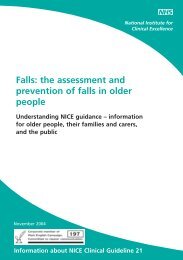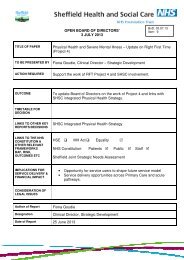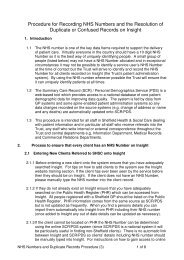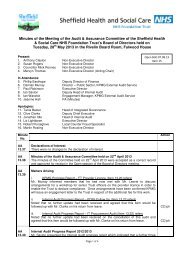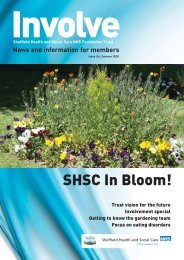Item 8 - Sheffield Health and Social Care
Item 8 - Sheffield Health and Social Care
Item 8 - Sheffield Health and Social Care
You also want an ePaper? Increase the reach of your titles
YUMPU automatically turns print PDFs into web optimized ePapers that Google loves.
How did we do?We have made positive progress with our helpline services, which have continued over this year. We willhave opened a new Crisis House service, in partnership with Rethink, in April 2013. We expect it to providesupport to over 300 people a year as an alternative to needing hospital care. As part of that service we havecommissioned Rethink to provide the helpline service for our service users.All inpatient staff have benefited from the RESPECT development <strong>and</strong> training programme by thesummer of 2012, <strong>and</strong> it is having a positive effect across our services. We continue to provide thetraining to support new staff who have since joined the service, <strong>and</strong> to provide updates to existingstaff who have been trained previously.Areas of experience 2010/11 2011/12 2012/13Awareness of crisis support available throughtelephone helpline (National Patient Survey)Ensure all inpatient staff have benefited fromRespect development programmeService users reporting they are treated withrespect (National Patient Survey)51 out of 100 5.0 out of 10 n/a see note*Note: We will use the national patient survey as a way of assessing feedback <strong>and</strong> progress over this year. Unfortunately the national survey hadnot been completed in time for us to include the results in this Report.We did not make the progress we wanted to regarding reviewing the information we share with serviceusers. We will address this better next year.Next year we intend to• Continue with the Respect developmentprogramme for new staff <strong>and</strong> the 15Steps Challenge to support the deliveryof improved experiences• Continue to review service user experiencesthrough local surveys• Complete the review of the range ofinformation we provide to service users<strong>and</strong> agree improvements• Focus on supporting service users to access ourservices quickly. To support this we will confirmimprovement targets in respect of our IAPTservices (assessed within 4 weeks of referral) <strong>and</strong>our Community Mental <strong>Health</strong> teams (assessedwithin 2 weeks of referral) <strong>and</strong> establish targetsfor our Memory services (see Quality Objective 5).Nil155 staffExtra 209364 in total95 out of 100 9.5 out of 10 n/a see noteStanage WardQuality objective 5: To improveaccess to the right care for peoplewith a dementiaWe chose this priority becauseImproving dementia care is a priority for theTrust, governors, the City Council, <strong>Sheffield</strong>Clinical Commissioning Group, <strong>and</strong> <strong>Health</strong>watch.The incidence of dementia is predicted to rise with<strong>Sheffield</strong>’s aging population. We know that earlyidentification <strong>and</strong> rapid access to services can delaythe impact of dementia <strong>and</strong> lead to a better qualityof care <strong>and</strong> better support for carers.Overall <strong>Sheffield</strong> performs well in comparisonwith other areas in the identification of peoplewith dementia, enabling them to access care<strong>and</strong> treatment. This is measured by people witha diagnosis on the Quality Outcomes Frameworkby their GP in primary care. In 2012 in <strong>Sheffield</strong>63.6% of the expected number of people witha dementia have been registered, compared tothe national average of 44.2%. <strong>Sheffield</strong> is the2nd best performing area in Engl<strong>and</strong> <strong>and</strong> Wales.We wanted to build on the delivery of theNICE Quality St<strong>and</strong>ard for Dementia <strong>and</strong> positivedevelopment work already underway over the lastfew years to improve access to our services <strong>and</strong>reduce waiting times. Within our learning disabilityservices a specific dementia care pathway has beendeveloped because of the increased risk of earlydementia in people with Downs syndrome.We have worked successfully in partnershipwith <strong>Sheffield</strong> Teaching Hospitals NHS FoundationTrust <strong>and</strong> <strong>Sheffield</strong> Clinical Commissioning Groupto improve access to dementia support <strong>and</strong> carefor people who require access to general hospital.We said we would• Continue the development of our Memorymanagement services so we could providemore assessments <strong>and</strong> reduce waiting times• Implement <strong>and</strong> evaluate the dementia pathwayfor adults with a learning disability• Develop <strong>and</strong> implement a plan to improveaccess to services by people from Black <strong>and</strong>Minority Ethnic Groups• Survey service users <strong>and</strong> carers of dementiaservices about their experience of care <strong>and</strong>respond to any issues raised.The outcome we wanted to achieve was• Support over 900 people with memoryassessments, <strong>and</strong> reduce service waitingtimes from 14.7 weeks• To establish a reliable baseline for the numberof people with learning disability receivingmemory assessments• To evaluate experience through service user<strong>and</strong> carer experience surveys for peoplereceiving dementia services from the MemoryManagement Service• To establish reliable baseline figures for peoplefrom different black <strong>and</strong> minority ethnic groupsuse of dementia services.Art therapy session on Ward G19798



